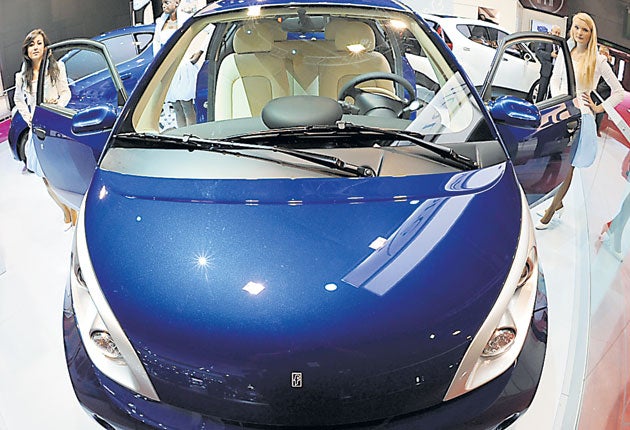Paris to overtake the Boris bike – by electric car

Your support helps us to tell the story
From reproductive rights to climate change to Big Tech, The Independent is on the ground when the story is developing. Whether it's investigating the financials of Elon Musk's pro-Trump PAC or producing our latest documentary, 'The A Word', which shines a light on the American women fighting for reproductive rights, we know how important it is to parse out the facts from the messaging.
At such a critical moment in US history, we need reporters on the ground. Your donation allows us to keep sending journalists to speak to both sides of the story.
The Independent is trusted by Americans across the entire political spectrum. And unlike many other quality news outlets, we choose not to lock Americans out of our reporting and analysis with paywalls. We believe quality journalism should be available to everyone, paid for by those who can afford it.
Your support makes all the difference.Here is a scene from the near future. Arriving at the Gare du Nord in Paris by Eurostar, you discover that, as usual, the taxi queue seems to stretch half-way back to the Channel Tunnel.
No problem. You dump your bags into the boot of a self-service, electric hire car and, braving the Parisian traffic, drive yourself to your hotel for just €7 (£5.95).
From next October, greater Paris will become the first conurbation in the world to experiment with an extensive system of self-service hire cars. The Autolib scheme – based on the highly successful Parisian bike-hire scheme, Vélib, which has recently been copied by London – will extend beyond the French capital to 41 suburban towns. The specially designed cars, about the size of a Mini or a Twingo, will be available for €7 for the first half hour. Signing up to the scheme will cost €10 a day, €15 a week or €144 a year.
"Autolibbeurs" will pick up a car from one of the 700 docking stations in Paris and leave it in a spare place at any other docking station (there will be 1,000 altogether). Each car will have a radio, a GPS route-finding system, and an on-board computer to direct the driver to docking stations with spare places.
The Socialist mayor of Paris, Bertrand Delanoë, conceded that similar but smaller schemes already exist in the Netherlands and in La Rochelle, western France. But Autolib, he said, would be "a world first on this scale".
His centre-right opposition, and even his Green allies, on the Paris city council remain unconvinced. The Greens fear that the scheme will increase the number of cars on Parisian streets, not reduce traffic as Mr Delanoë claims. Centre-right councillors are concerned it could prove an expensive white elephant.
More than 20,000 Vélib bicycles have been stolen or vandalised since that scheme began in July 2007. So what is to stop people stealing the 3,000 far more expensive Autolib cars? Each battery-driven car will have a 250km limit and a tracking device. There would be little, in practice, to stop thieves from giving false credit card and driving-licence details and loading an Autolib onto a truck. That, however, is also true of classic hire cars, which are easier to resell and refuel.
Much of the initial risk is being carried by Bolloré group, the conglomerate that bid successfully to run Autolib. Owned by the billionaire French tycoon Vincent Bolloré, it is already a world leader in developing electric cars and the lithium batteries that power them.
The Autolib cars will be a four-seat variant, built in Turin, of the group's existing Blue Car launched in 2005. Bolloré hopes that a successful Autolib programme in Paris will attract the attention of Boris Johnson and other mayors of major cities, and help to break down psychological and technical barriers to electric motoring.
Join our commenting forum
Join thought-provoking conversations, follow other Independent readers and see their replies
Comments